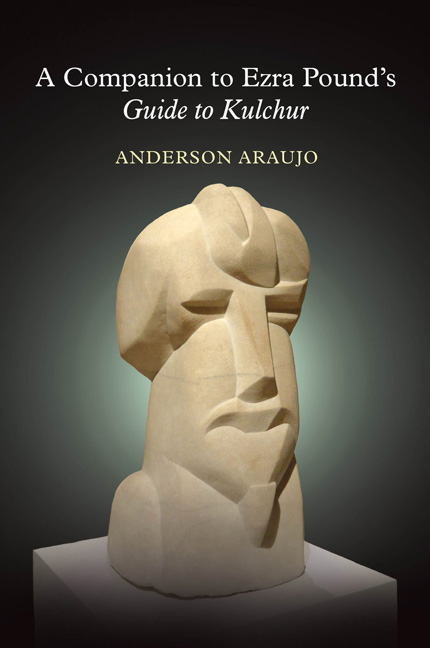Book contents
- Frontmatter
- Contents
- Acknowledgments
- Abbreviations
- Introduction
- Guide to Kulchur
- Part I
- Section I
- Section II
- Part II
- Section III
- Section IV
- Part III
- Section V
- Section VI
- Part IV
- Section VII
- Section VIII
- 29 Guide To Kulchur
- 30 The Proof Of The Pudding
- 31 Canti
- 32 The Novel And So Forth
- 33 Precedents
- 34 On Arriving And Not Arriving
- 35 Praise Song Of The Buck-Hare
- 36 Time-Lag
- 37 The Culture Of An Age
- Section IV
- Part V
- Section X
- Section XI
- Part VI
- Section XII
- Section XIII
- Addenda: 1952
- Notes
- Index
33 - Precedents
from Section VIII
- Frontmatter
- Contents
- Acknowledgments
- Abbreviations
- Introduction
- Guide to Kulchur
- Part I
- Section I
- Section II
- Part II
- Section III
- Section IV
- Part III
- Section V
- Section VI
- Part IV
- Section VII
- Section VIII
- 29 Guide To Kulchur
- 30 The Proof Of The Pudding
- 31 Canti
- 32 The Novel And So Forth
- 33 Precedents
- 34 On Arriving And Not Arriving
- 35 Praise Song Of The Buck-Hare
- 36 Time-Lag
- 37 The Culture Of An Age
- Section IV
- Part V
- Section X
- Section XI
- Part VI
- Section XII
- Section XIII
- Addenda: 1952
- Notes
- Index
Summary
Brantôme: Pierre de Bourdeille, Seigneur et Abbe de Brantome (c.1540–1614), French writer of exemplary historical biographies, collected in Memoires de Messire Pierre de Bourdeilles (1665–66). Brantome's appeal for Pound may be attributed in part to his belief in the stylistic virtues of clarity and precision in prose.
McKail's Latin Literature: Historical survey by classical scholar, literary critic, and poet John William Mackail (1859– 1945). Published in 1895, it traces the origins of Latin poetry and prose.
Lionel Johnson's Post Liminium: Written by the poet and literary scholar Lionel Pigot Johnson (1867–1902), the collection comprises essays and critical papers on a range of English and European literary and historical figures and subjects, beginning with Walter Pater.
Fontenelle: Cf. note GK 31.
Landor: Cf. note GK 84.
Bayle's Dictionnaire nor Voltaire's: i.e., Bayle's Dictionnaire historique et critique (1695–97) and Voltaire's Dictionnaire philosophique (1764) (cf. notes GK 50, 54).
what I attempted in How to Read or in the A B C of Reading: The first edition of How to Read was published in London in December 1931. ABC of Reading appeared in print three years later “to meet the need for fuller and simpler explanation of the method outlined” in the earlier book, which Pound admits may be seen as a “controversial pamphlet.” In a February 1937 letter, Pound outlines the structure of his nascent manuscript for GK to F. V. Morley, one of the directors at Faber, characterizing its literary component as a “restatement” (but not a “repeat”) of his earlier two books.
Pitigliano: Medieval town in Tuscany, also known as La Piccola Gerusalemme (Little Jerusalem) for harboring a sizable community of Jewish emigres seeking refuge from the restrictions imposed by neighboring independent feudal enclaves, from around the end of the fifteenth century onward. At the beginning of Canto 10, Pound quotes loosely translated fragments from a letter Aldobrandino Orsino, Count of Pitigliano, sent to Sigismundo Malatesta, who had mounted a siege on behalf of Siena to retake strongholds seized by Pitiligano (10/42).
- Type
- Chapter
- Information
- A Companion to Ezra Pound's Guide to KulcherGuide to Kulcher, pp. 238 - 239Publisher: Liverpool University PressPrint publication year: 2018



